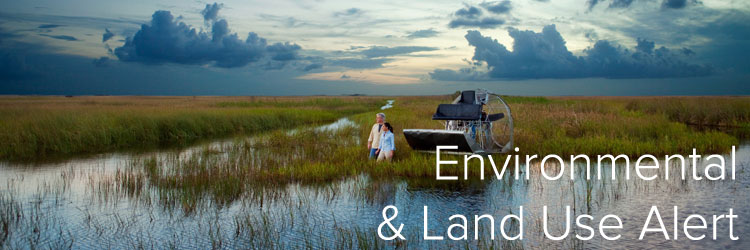
The United States Fish and Wildlife Service (FWS) is in the process of revising its mitigation policy, which will guide development of more specific procedures and standards in future program-specific policies, handbooks, and guidance documents. The current mitigation policy has been in existence since 1981. The draft Mitigation Policy was published in the Federal Register on March 8, 2016 and based on public comment to date, FWS has granted an extension of time to file comments on the draft policy until June 13, 2016. FWS expects to have a final draft Mitigation Policy in November 2016.
The draft Mitigation Policy focuses on the implementing a “landscape-scale” approach to mitigation, versus piecemeal mitigation efforts. FWS’s new draft policy emphasizes achieving a net gain in conservation outcomes, or at a minimum, no net loss of resource values and functions. The “landscape-scale” approach is intended to integrate mitigation into the broad ecological context, including climate change. Landscape is defined as “an area encompassing an interacting mosaic of ecosystems and human systems that is characterized by common management concerns.” It outlines policies for assessment of resources and projected impacts, habitat valuation, and avoidance, minimization and compensation factors used in development in FWS mitigation recommendations.
FWS also states the draft Mitigation Policy is also intended to foster partnerships with Federal and State entities, tribes, and other stakeholders on a regional scale. This effort is to prevent fragmented landscapes and to restore core areas and connections necessary to sustain species. The draft policy would encourage collaboration and coordination efforts including the use of public and private lands, integration of federal and non-federal activities, and established conservation initiatives, including mitigation banking, in order to achieve resource protection and recovery in the most effective and efficient means.
Businesses that regularly interface with the FWS would be well served by reviewing and commenting on this draft policy, as it will drive the formation of more specific FWS mitigation requirements.
For additional information on this proposed federal action, please contact Attorneys Luna Phillips (954 712-1478) or Cecile Piverotto at (772 223-2201)
Yes! Please sign me up to receive email alerts from other Gunster practice areas.
This publication is for general information only. It is not legal advice, and legal counsel should be contacted before any action is taken that might be influenced by this publication.
About Gunster
Gunster, Florida’s law firm for business, provides full-service legal counsel to leading organizations and individuals from its 13 offices statewide. Established in 1925, the firm has expanded, diversified and evolved, but always with a singular focus: Florida and its clients’ stake in it. A magnet for business-savvy attorneys who embrace collaboration for the greatest advantage of clients, Gunster’s growth has not been at the expense of personalized service but because of it. The firm serves clients from its offices in Boca Raton, Fort Lauderdale, Jacksonville, Miami, Naples, Orlando, Palm Beach, Stuart, Tallahassee, Tampa Bayshore, Tampa Downtown, Vero Beach, and its headquarters in West Palm Beach. With more than 280 attorneys and consultants, and over 290 committed professional staff, Gunster is ranked among the National Law Journal’s list of the 500 largest law firms and has been recognized as one of the Top 100 Diverse Law Firms by Law360. More information about its practice areas, offices and insider’s view newsletters is available at www.gunster.com.
